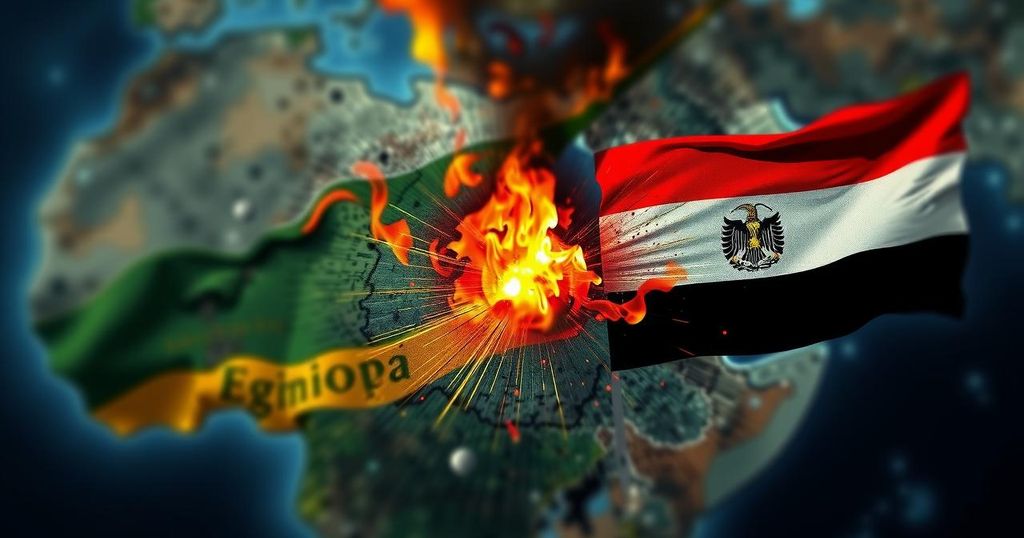Ethiopia has recognized Somaliland, causing tensions with Somalia, which aligns itself with Egypt amid ongoing disputes. Egypt has deployed military forces in Somalia to counter Ethiopia over water security issues tied to the Grand Ethiopian Renaissance Dam. This situation raises concerns about instability and the potential for proxy conflicts in a volatile region.
Ethiopia is strategically seeking alternative access to the sea, prompted by ongoing tensions with Somalia. On January 1, 2024, Ethiopia declared it had formalized a deal with Somaliland, planning to recognize the self-proclaimed republic in exchange for granting access to a naval base on its coastline. This agreement immediately created friction with Somalia, which considers Somaliland an integral part of its territory. In response, Somalia has sought to align itself with Egypt, viewing the North African state as a pivotal ally amidst its territorial disputes with Ethiopia. Egypt, historically an adversary of Ethiopia, perceives the Grand Ethiopian Renaissance Dam (GERD)—a significant undertaking by Ethiopia—as a direct threat to its water security. In August 2024, following a defense agreement with Somalia, Egypt deployed military forces to the region and intends to contribute 5,000 troops to the African Union Support and Stabilisation Mission in Somalia. This mission aims to replace the current African Union Transition Mission, in which Ethiopia has been significantly involved. The diplomatic acknowledgment of Somaliland by Ethiopia has further strained its relations with Somalia, especially after it established an ambassadorial presence in Hargeisa. Subsequently, Somaliland has taken steps to close Egyptian cultural institutions within its territory, reflecting the deepening divide. Meanwhile, Eritrea, previously a key ally to Ethiopian Prime Minister Abiy Ahmed, is realigning its support amidst ongoing regional strife, fostering alliances with Somalia and Egypt, against Ethiopia. Ethiopia’s involvement in stabilizing Somalia is now questioned, as Somalia’s government calls for an end to Ethiopian influence. The potential withdrawal of Ethiopian forces could allow militant groups to increase their power, jeopardizing Somalia’s stability. Complicating matters further, longstanding territorial claims exist among Somalis over regions in Ethiopia, Kenya, and Djibouti, raising the stakes for conflict. Additionally, tensions have escalated between Djibouti and Somaliland due to the port agreement, which is anticipated to negatively impact Djibouti’s economy, which heavily relies on trade linked to Ethiopian access to the sea. As these dynamics unfold, the geopolitical climate is ripe for proxy conflicts amidst myriad ongoing crises, including fraught relations between Ethiopia and Eritrea, the contentious Ethiopia-Sudan border dispute, and Ethiopia’s internal instability. With these areas poised to serve as flashpoints, Egypt’s strategic alignment with Sudan regarding the GERD poses additional risks for Ethiopia. To de-escalate these growing tensions, both Ethiopia and Egypt need to reassess their approaches, exercising restraint in their military engagements. Notably, Ethiopia could maintain access to the sea through Somaliland without recognizing its independence, potentially averting further separatist movements. Concurrently, Egypt ought to pursue diplomatic avenues to address its concerns regarding the GERD via international platforms such as the United Nations and the African Union, avoiding unilateral actions that could exacerbate regional tensions. It is imperative for regional actors to prioritize stability; unilateral decisions will only magnify the adverse consequences for all engaged parties.
The geopolitical landscape of the Horn of Africa has become increasingly complex, marked by historic rivalries, territorial disputes, and resource-related conflicts. The Grand Ethiopian Renaissance Dam has been at the center of Egypt and Ethiopia’s long-standing tension, with both nations having diverging priorities over Nile waters. The involvement of Somaliland in Ethiopia’s regional aspirations further complicates the relationships among Ethiopia, Somalia, and Egypt, inviting even wider regional implications. The historical context of these disputes, coupled with the active role of external powers like Egypt, creates a precarious environment for peace and stability in the Horn.
To summarize, the recognition of Somaliland by Ethiopia and Egypt’s military engagement in Somalia are pivotal developments with profound implications for regional stability. The emerging alliances and territorial claims among these nations highlight the urgent need for diplomatic resolution and strategic restraint. Failure to navigate these tensions could lead to further destabilization in the Horn of Africa, affecting all nations within this interconnected region.
Original Source: www.theafricareport.com






